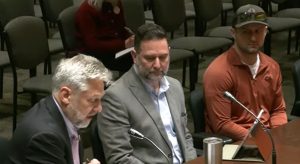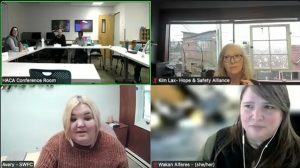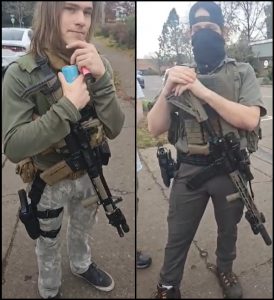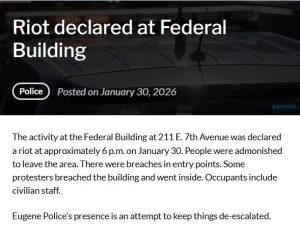Proposed budget cuts ‘a tremendous step backwards’ for animal services
5 min read
With city budget discussions underway, an advisory committee hears about drastic cuts for animal services. From Greenhill Humane Society, Director of Operations Sasha Elliott.
[00:00:10] Sasha Elliott: A new Request For Proposal (RFP) was made public and the description of the services is drastically different than the services that have been provided with Greenhill’s relationship with the city since 2012.
[00:00:29] This particular Request For Proposal states that animals delivered to the public sheltering and adoption facility by City of Eugene citizens are not part of the scope of services for this RFP, which, barring any other information, leads me to believe that there is not a plan for animals found by good Samaritans within the city of Eugene…
[00:00:53] The current contract, I believe is around $480,000 annually. I believe the new contract is just under $208,000 per year.
[00:01:09] John Q: At the county’s Animal Services Advisory Committee, on March 13, chair Scott Bartlett.
[00:01:15] Scott Bartlett: Would you say that again?
[00:01:16] Sasha Elliott: $208(K), rounded up. $208,000 per year.
[00:01:21] Scott Bartlett: I’m astounded. That’s more than a 50% reduction. (It is.) And if this was carried out, what would be the approximate reduction…?
[00:01:30] John Q: The proposed cuts could mean over 900 fewer animals served each year.
[00:01:38] Sasha Elliott: We’ve been informed that as of July 1, the start of the new fiscal year, there will be a reduction in Eugene animal welfare officers, taking the team down to two people from three.
[00:01:52] The officer who was told that her job no longer exists as of July 1 was specifically told that they were removing the position. She was not being laid off. She was not put on temporary leave, the position was dissolving. So that’s a third of their field force.
[00:02:11] The total number of ‘public’ animals within the City of Eugene was 783. So that potentially leaves 783 animals uncared for, potentially causing public safety issues. The total officer intake was 386. So if we take a third of that out, that’s about 130 animals—
[00:02:40] Scott Bartlett: That would not be brought to the facility—
[00:02:42] Sasha Elliott: That may not have access to be brought anywhere safe. (No!) That’s near 1,000.
[00:02:48] Scott Bartlett: What they’re—under this RFP, members of the public who find stray, injured, or lost, abandoned animals, the city wouldn’t pay for the handling and reception of these animals.
[00:03:03] Sasha Elliott: There may be information that the city has that has not been made public, if they have a plan for good Samaritans to have support, should they find a stray, injured, abandoned animal. According to this RFP, they do not have a plan. They may have a plan that they just have not made public yet. I’m not privy to that information.
[00:03:27] John Q: With ‘public’ animals out of the contract, there are legal consequences, and significantly increased costs.
[00:03:35] Sasha Elliott: The reason that we as Greenhill enjoy contracts with Lane County, the City of Veneta, the City of Cottage Grove, etc., is because we have been given the responsibility to act as an agent upon their behalf.
[00:03:53] If we do not hold a relationship with the City of Eugene and are forced to follow the property laws, that would significantly impact the number of animals that we would be able to help.
[00:04:09] Animals are considered property in Oregon. So there has to be a public posting of found property. And there has to be a length of time in which that property is taken care of, but not altered.
[00:04:21] So from a veterinary perspective, there’s a limitation in terms of what sort of medical care we can provide for an animal before ownership is either reunited with that initial owner or is transferred to our organization.
[00:04:38] Barring that agreement, wherein a private organization is asked to act on behalf of or as an extension of a legal agency, then property laws come into play. It would elongate that necessary holding period from 120 hours or five days all the way up to 45 or 90 days depending on the jurisdiction.
[00:05:07] That is unfathomable for the number of animals that we care for each year, the thousands of animals that we care for each year. So I think we’re reviewing this Request For Proposal very carefully to see if the needs that the city is looking for aligns with what we as a private organization are able to fulfill.
[00:05:29] Scott Bartlett: Now, did anyone at the city tell you why they’re making a 60% slashing cut in their proposed budget? I mean, this has shocked your organization, hasn’t it?
[00:05:43] Sasha Elliott: I, I think it’s disheartening and I think the progress that has been made for animals and the people who are connected to animals within our community, has progressed leaps and bounds over the last 10 years: Officers enjoy 365-days-a-year, 24-hours-a-day access to a safe, sheltering facility should they find any animal in crisis within all of Lane County. Basically any species except horses (and cows) and very large cows, we can handle. And the officers have access, not only the animal welfare officers, but sheriffs, deputies, CAHOOTS, a variety of people that are first responders out in the community, assisting people who may be in crisis.
[00:06:40] And this feels like a tremendous step backwards.
[00:06:44] As far as I can tell, there is no safety net for citizens of Eugene who find animals.
[00:06:52] Scott Bartlett: I wonder if our committee should write a letter just briefly communicating with the Board of Commissioners: ‘Dear Board of Commissioners, We want to call your attention to an impending crisis of animal services within the metropolitan and Lane County area…disallowing citizens of Eugene from transporting found, lost, strayed, or abandoned animals.’
[00:07:16] Now let me ask. Worst case scenario: If Greenhill was unable to continue a relationship with Eugene because of this impossible reduction, is it conceivable that a great number of animals could be more subjected to euthanasia, theoretically?
[00:07:34] Sasha Elliott: It depends on if the city has a plan for good Samaritans who find animals. That may not be included in this RFP. If there is one, I’m not aware of it.
[00:07:45] John Q: Local partners start seeing the first numbers detailing proposed budget cuts at the city.
This story was recommended by a resident of the Southwest Hills Neighborhood Association (SHiNA). Become a correspondent for your neighborhood. Volunteer through your neighborhood association.







